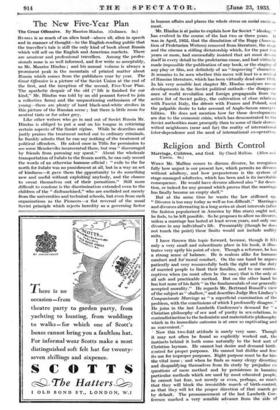The New Five-Year Plan
The Great Offensive. By Maurice Hindus. (Gollanez. es.)
RUSSIA is so much of an alien land—above all, alien in speech and in manner of thought—to the English-reading public that the traveller's tale is still the only kind of book about Russia -which will sell on the English and- American markets. There are amateur and professional travellers. Among the profes- sionals none is so well informed, and few write so acceptably, as Mr. Maurice Hindus ; and his annual volume is always a prominent peak in the mountain of printed matter about Russia which comes from the publishers year by year. The 'Great Offensive is a picture of the Soviet Union at the end of the first, and the inception of the second, Five-Year Plan'. The apathetic despair of the old (" life is finished" for our kind," Mr. Hindus was told by an old peasant forced to join a collective farm) and the unquestioning enthusiasm of the young—there are plenty of hard black-and-white strokes in this picture of the Russian scene ; but there is little room for neutral tints or for sober grey.
Like other writers who go in and out of Soviet Russia Mr'. Hindus is obliged to put a seal on his tongue in criticizing certain aspects of the Soviet regime. While he describes and justly praises the treatment meted out to ordinary Criminals, he frankly admits that he can say nothing of the treatment of political offenders. He asked once- in Tiflis for permission to see some Mensheviks incarcerated there, but was " discouraged by friends from pursuing my quest." About the wholesale transportation of kaiaks to the frozen north, he can only record the words of an otherwise humane-official : " exile to the far north for kaiaks was no punishment at all, but in a way an act of kindness—it gave them the ,ppportunity to do something new and useful without exploiting anybody, and the chance to sweat themselves out of their parasitism" Still more difficult to condone is the discrimination extended even to the children of the " disfranchised," "who are excluded not merely from the universities and technical schools, but even from such organizations as the Pioneers—a flat reversal of the usual Soviet principle which rejects heredity as a governing factor
in human affairs and places the whole stress on social environ- ment.
Mr. Hindus is at pains to explain how far Soviet " ideology" has evolved in the course of the last two or three years. It Avas_in April, 1932, that the dissolution of the Rapp (Associa- ition of Proletarian Writers) removed from literature, the stage and the cinema a stifling dictatorship which, for the past live years or more, had successfully insisted that art must devote itself in every detail to the proletarian cause, and had virtually made impossible the-publication of any book, or the staging of any play or film, not definitely of an " improving " character. It remains to be seen whether this move will lead to a revival of Russian literature, which has been virtually dead since 1926. In his very sensible last chapter Mr. Hindus analyses recent developments in the Soviet political outlook—the disappear- ance of world revolution and foreign propaganda from the active list of Soviet policy, the cultivation of close relations with Fascist Italy, the détente with France and Poland, and the palpable. desire to take account of Anglo-Saxon suscepti- bilities. He does not mention how far these developments are due to the economic crisis,' which has demonstrated to the Soviet authorities more promptly than to some of their slower- witted neighbours (near and far) the reality of international inter-dependence and the need of international co-operation.








































 Previous page
Previous page